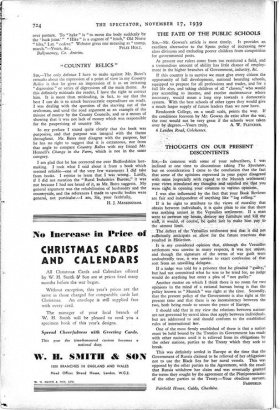THOUGHTS ON OUR PRESENT DISCONTENTS
SIR,—In common with some of your subscribers, I was inclined at one time to discontinue taking The Spectator, but on consideration I came to the conclusion that the fact that some of the opinions expressed in your paper disagreed with mine (especially ,with regard to the Munich settlement) your views stimulated .my thoughts and satisfied me that you were right in opening your columns to various opinions..
I was also influenced by the fact that your Book Reviews are fair and independent of anything like " log rolling."
If it be right to attribute to the views of morality that obtain between individuals, it is quite plain to me that there was nothing unjust in the Versailles settlement. If a man were to overrun my hk:H.Lie, deitroy my furniture and kill my staff, it would, of .ecidise;The quite just to Make him pay to the utmost limit.
The_defect of the ,Veisailles settlement was that *it did not sufficiently anticipate or. Allow for the future reactions that resulted in Hitlerism.
It is my considered opinion that, although the Versailles settlement was unwise in many respects, it was not unjust, and though the signature of the terms of war guilt were undoubtedly true, it was unwise to exact confession of that sort from an unwilling delegate..
If a judge was told by a prisoner that he pleaded " guilty," but had not committed what he was to be tried for, no judge would do anything but enter a plea of " not guilty."
Another matter on which I think there is no room for two opinions in the mind of a rational human being is that the policy known as " Munich " was right at the time. Secondly, that the present policy of the Government is also right at the present time and that there is no inconsistency between the two, both being made to secure the peace of Europe.
I should add that in my view the relations between nations are not governed by moral ideas that apply between individuals, but are addressed to and should conform to the established rules of international law.
One of the most firmly established of these is that a nation must be held bound by the Treaties its Government has made with other nations until it is relieved from its obligations by the other nations, parties to the Treaty which they seek to break.
This was definitely settled in Europe at the time that the Government of Russia claimed to be relieved of her obligations not to use the Black Sea for her naval vessels. This was opposed by the other parties to the Agreement, with the result that Russia withdrew her claim and was eventually granted the terms they sought by the agreement of the Plenipotentiaries of the other parties to the Treaty.—Your obedient servant, FAIRFIELD.
Fairfield House, Caldy, Cheshire.




































































 Previous page
Previous page